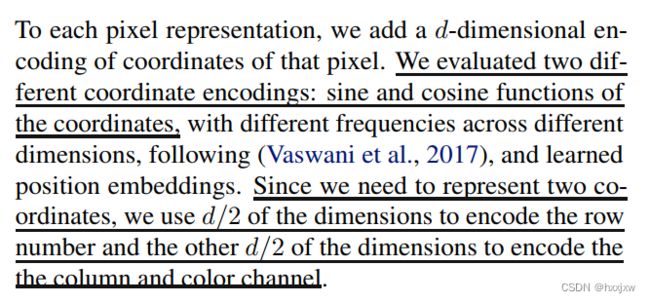Pytorch 实现position embedding位置编码(三)——DETR中的位置编码(2d的绝对位置编码)(PositionEmbeddingSine正余弦位置编码)
DETR的position embedding是PositionEmbeddingSine(),它就叫做正余弦位置编码,没有PositionEmbeddingCos的写法
是借鉴自Image Transformer,它paper中有说
即就是原Transformer 的position embedding的思想,实现也差不多,但是 generalized to work on images,而且考虑了padding mask
前一半是col的,后一半是row的,然后拼起来
temperature就是原Transformer paper中的10000
跟MAE中用的一样
是在 x, y 方向上分别独立进行位置编码
我这里输入用torch.rand()生成,但是实际code中的输入值可并不是只在(0,1) 范围中的
import torch from torch import nn import math class NestedTensor(object): def __init__(self, tensors, mask): self.tensors = tensors self.mask = mask if mask == 'auto': self.mask = torch.zeros_like(tensors).to(tensors.device) if self.mask.dim() == 3: self.mask = self.mask.sum(0).to(bool) elif self.mask.dim() == 4: self.mask = self.mask.sum(1).to(bool) else: raise ValueError("tensors dim must be 3 or 4 but {}({})".format(self.tensors.dim(), self.tensors.shape)) def imgsize(self): res = [] for i in range(self.tensors.shape[0]): mask = self.mask[i] maxH = (~mask).sum(0).max() maxW = (~mask).sum(1).max() res.append(torch.Tensor([maxH, maxW])) return res def to(self, device): # type: (Device) -> NestedTensor # noqa cast_tensor = self.tensors.to(device) mask = self.mask if mask is not None: assert mask is not None cast_mask = mask.to(device) else: cast_mask = None return NestedTensor(cast_tensor, cast_mask) def to_img_list_single(self, tensor, mask): assert tensor.dim() == 3, "dim of tensor should be 3 but {}".format(tensor.dim()) maxH = (~mask).sum(0).max() maxW = (~mask).sum(1).max() img = tensor[:, :maxH, :maxW] return img def to_img_list(self): """remove the padding and convert to img list Returns: [type]: [description] """ if self.tensors.dim() == 3: return self.to_img_list_single(self.tensors, self.mask) else: res = [] for i in range(self.tensors.shape[0]): tensor_i = self.tensors[i] mask_i = self.mask[i] res.append(self.to_img_list_single(tensor_i, mask_i)) return res @property def device(self): return self.tensors.device def decompose(self): return self.tensors, self.mask def __repr__(self): return str(self.tensors) @property def shape(self): return { 'tensors.shape': self.tensors.shape, 'mask.shape': self.mask.shape } #code is from DETR class PositionEmbeddingSine(nn.Module): """ This is a more standard version of the position embedding, very similar to the one used by the Attention is all you need paper, generalized to work on images. """ def __init__(self, num_pos_feats=64, temperature=10000, normalize=False, scale=None): super().__init__() self.num_pos_feats = num_pos_feats self.temperature = temperature self.normalize = normalize if scale is not None and normalize is False: raise ValueError("normalize should be True if scale is passed") if scale is None: scale = 2 * math.pi self.scale = scale def forward(self, tensor_list): x = tensor_list.tensors mask = tensor_list.mask assert mask is not None not_mask = ~mask #沿h维 y_embed = not_mask.cumsum(dim=1, dtype=torch.float32) #[bs,h,w] #沿w维 x_embed = not_mask.cumsum(dim=2, dtype=torch.float32) #[bs,h,w] if self.normalize: eps = 1e-6 y_embed = (y_embed - 0.5) / (y_embed[:, -1:, :] + eps) * self.scale x_embed = (x_embed - 0.5) / (x_embed[:, :, -1:] + eps) * self.scale dim_t = torch.arange(0, self.num_pos_feats, dtype=torch.float32, device=x.device) #[num_pos_feats] #temperature就是原Transformer paper中的10000 dim_t = self.temperature ** (2 * (dim_t // 2) / self.num_pos_feats) #[num_pos_feats] pos_x = x_embed[:, :, :, None] / dim_t #[bs,h,w,dim/2] pos_y = y_embed[:, :, :, None] / dim_t #[bs,h,w,dim/2] #可以看到pos_x和pos_y是一样的, 偶数维度sin,奇数维度cos #这里的做法就是偶数维度前一半,奇数维度后一半,然后拼起来 pos_x = torch.stack((pos_x[:, :, :, 0::2].sin(), pos_x[:, :, :, 1::2].cos()), dim=4).flatten(3) #[bs,h,w,dim/2] pos_y = torch.stack((pos_y[:, :, :, 0::2].sin(), pos_y[:, :, :, 1::2].cos()), dim=4).flatten(3) #[bs,h,w,dim/2] #y维(h维)的position和x维(w维)的position 再拼起来 pos = torch.cat((pos_y, pos_x), dim=3).permute(0, 3, 1, 2) #[bs,dim,h,w] return pos x = torch.randn(4, 256, 224, 124) #[bs,dim,h,w] mask = torch.rand(4, 224,124) > 0.5 #[bs,h,w] x = NestedTensor(tensors=x, mask=mask) pos_emb = PositionEmbeddingSine(256//2, normalize=True) res = pos_emb(x) #[bs,dim,h,w] print(res.shape)
